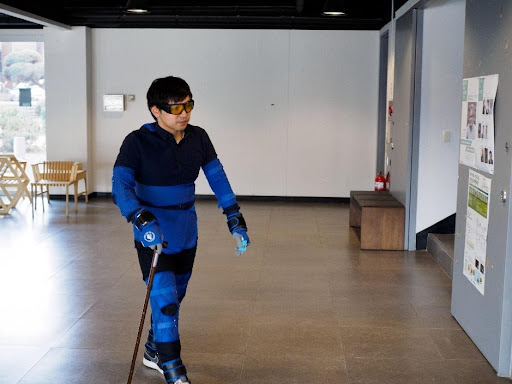- A research group called “Aging and Technology Policy Lab” focuses on examining the mechanisms of social problems related to population ageing and new technologies and providing policy analysis and recommendations on the issues. Its current research projects include policy research on older drivers based on big data analytics, artificial intelligence fairness.
- KAIST students taking the QoLT and social policy course are expected to complete an age suit experiment, which helps them in their early 20s understand what becoming old is like. While wearing the age suits, students are asked to send a text message to their friends and check emails; then, they find how challenging it is, particularly for those with low vision and decreased skin sensitivity. This experiment helps students see their built environment from the perspective of diverse social groups.
The Republic of Korea will likely become the first country wherein life expectancy will exceed 90 years (Kontis, V. et al., 2017). One out of three Korean women who are currently 20 years old is likely to live up to 100 years old (Chosun Ilbo, 2020). About a half-century ago, the age symbolic for longevity in Korea was 60 years old, and extended family members tended to get together to celebrate the 60th birthday of their beloved one to celebrate their longevity, called “Hwan-gap.” Hwan-gap was the experience only a certain proportion of people could reach and have. Now, Koreans have 30 more years after reaching their 60th anniversary of birth. This extended old age has transformed our expectations and experiences of the life course. Just think: if our lives were equal to one day, 30+ years of old age means that we have eight+ hours to spend as older people.
I founded and ran a research group called “Aging and Technology Policy Lab” (https://aging.kaist.ac.kr) since I joined the Graduate School of Science and Technology Policy at KAIST in 2014, followed by ten years of pre-doctoral, post-doctoral training and professorship in the U.S. The lab focuses on examining the mechanisms of social problems related to population ageing and identifying and harnessing new technologies that may address these problems, as well as providing policy analysis and recommendations on the issues. Its current research projects include policy research on older drivers based on big data analytics, artificial intelligence fairness with a focus on ageism and sexism, welfare technology and active ageing using a living lab approach, and future smart home research. Researches include seeking solutions to solve current and emerging social problems to promote evidence-based policy-making, with a special interest in improving the quality of life of marginalised people such as older people, people with disabilities, ethnic minorities, and people under poverty.
KAIST offer related courses to students as well, including “Technology and Social Justice,” “Measuring Unmeasurable Things”, and “Quality of Life Technology and Social Policy.” Students taking the QoLT and Social Policy course are expected to complete an age suit experiment, which helps them in their early 20s understand what becoming old is like. While wearing the age suits, students are asked to send a text message to their friends and check emails; then, they find these tasks challenging, particularly for those with low vision and decreased skin sensitivity. This experiment helps students see their built environment from the perspective of diverse social groups—a sort of “Aha!” moment.

Figure. Age Suit Experiment. Photo : Hakjun Oh.
(You can watch the whole video here: https://aging.kaist.ac.kr/films)
One of our recent research projects supported by the National Research Foundation of Korea focused on age-friendly cities in Asia. The World Health Organization established the Global Network for Age-friendly Cities and Communities (GNAFCC) in 2010, aiming to stimulate and enable cities and communities to become increasingly age-friendly by connecting cities and communities worldwide to exchange information and experience (WHO, n.d.) Our lab built a database of WHO GNAFCC members, including city name, population, the proportion of adults aged 60+, and joining year by the end of 2018. The analysis using the database showed that most cities/communities in the Network were in North America and Europe. Although Asia represented a relatively small proportion of GNAFCC, Korea was a leading country in Asia.
Extended old age — that eight+ hours per day many of us will have — has been changing our outlook over the future, challenging the way we build, live, work, play and take care of others. The Republic of Korea, where the digital revolution meets the longevity revolution, offers a unique environment for gerontechnology. The Aging and Technology Policy Lab is open to international collaborations, creating synergy across disciplines and borders.






NO COMMENT